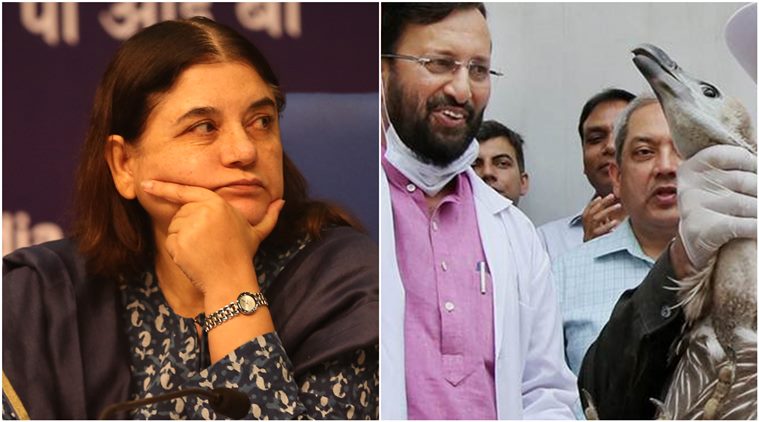Stay updated with the latest - Click here to follow us on Instagram
Maneka Gandhi vs Prakash Javadekar over culling of animals
Maneka’s anger was directed at three notifications issued by the Environment Ministry in the last six months, each declaring a wild animal ‘vermin’, or pest, in a state for the period of one year. The ministry had, in December, declared blue bull, or nilgai, a vermin in Bihar.
 Environment Ministry in December, declared blue bull, or nilgai, a vermin in Bihar. In February, it classified wild boars as vermin in Uttarakhand, and a month later, monkeys were declared vermin in Himachal Pradesh.
Environment Ministry in December, declared blue bull, or nilgai, a vermin in Bihar. In February, it classified wild boars as vermin in Uttarakhand, and a month later, monkeys were declared vermin in Himachal Pradesh.Women and Child Development Minister Maneka Gandhi Thursday launched an unexpected attack on her ministerial colleague Prakash Javadekar, accusing the Environment Ministry led by him of carrying out state-mandated killing of a large number of protected wild animals in several parts of the country.
Javadekar exercised restraint in responding, only pointing out that the killing of wild animals in certain states was being done in accordance with law and on the request of state governments. But, he got one of his officers to issue a statement asserting that the ministry had only given “permission for scientific management” after examining requests from state governments.
WATCH VIDEO: Javadekar’s Reply To Maneka: Government Culls Animals For A Reason
Maneka’s anger was directed at three notifications issued by the Environment Ministry in the last six months, each declaring a wild animal ‘vermin’, or pest, in a state for the period of one year. The ministry had, in December, declared blue bull, or nilgai, a vermin in Bihar. In February, it classified wild boars as vermin in Uttarakhand, and a month later, monkeys were declared vermin in Himachal Pradesh.
READ | Maneka takes on Javadekar, third time in six months
Such a declaration paves the way for the killing of wild animals which pose a danger to human life or property, including standing crops.
While the notifications were issued a while ago, the immediate trigger for Maneka’s outburst seems to be news reports of large-scale killing of nilgai in Bihar.
[related-post]
“The Environment Ministry, suo motu, issued a letter asking states to come forward with proposals (to kill wild animals). They then gave the go-ahead for killing elephants in West Bengal, wild boars in Uttarakhand, peacocks in Goa, nilgai in Bihar,” Maneka, a former environment minister and a well-known animal rights activist, said.
“I don’t understand this lust for killing,” she said.
 The Environment Ministry issued a clarification following her remarks. “Last year, more than 500 people lost their lives in human-wildlife conflicts. There are standard operating processes laid down in the Wildlife (Protection) Act, 1972 (to kill wild animals damaging human life or crops). Therefore, the ministry has not given any permission to kill either deer, peacock or elephant,” S K Khanduri, Inspector General (Wildlife), said in a statement.
The Environment Ministry issued a clarification following her remarks. “Last year, more than 500 people lost their lives in human-wildlife conflicts. There are standard operating processes laid down in the Wildlife (Protection) Act, 1972 (to kill wild animals damaging human life or crops). Therefore, the ministry has not given any permission to kill either deer, peacock or elephant,” S K Khanduri, Inspector General (Wildlife), said in a statement.
Section 11 of the Wildlife (Protection) Act, 1972 empowers the chief wildlife warden of a state to permit “any person” to “hunt” a protected wildlife animal if he is satisfied that it has “become dangerous to human life or is so disabled or diseased as to be beyond recovery”. Another provision in the same section gives the officer the same power in case the wild animal becomes “dangerous to human life or to property (including standing crops on any land)”.
“As per the provision of law, if there are complaints about the wildlife conflict, the state government has to submit a proposal (to kill the animals). Till date, five states have submitted the proposal. The ministry examines the proposal in detail and allows scientific management in specific area for a limited time. There were complaints about wild boar, blue bull (nilgai) and other animals. Accordingly, these proposals have been examined and given permission for scientific management for a limited time for a specific area in the three states of Uttarakhand, Bihar and Himachal Pradesh. Proposals of Maharashtra are still being examined,” Khanduri said.







